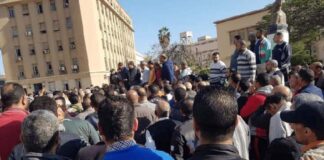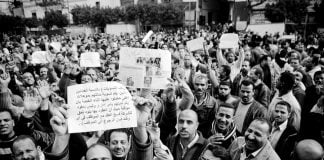Two years on, Erima Dall discusses role of the Muslim Brotherhood in the Egypt and the challenges ahead for the revolution that toppled a dictator
Two years ago the Egyptian people flooded onto the streets and into the centre of world history. In 18 days they overthrew dictator Hosni Mubarak, who had ruled with the backing of the United States for almost 30 years. Mubarak’s downfall marked the beginning of a revolutionary process which continues to unfold.
The slogans of the revolutionaries have not changed. They remain “bread, freedom and social justice” and “the people want the downfall of the regime”. That is because the nature of the regime they are fighting has not changed.
In 2011, the target of protests shifted from Mubarak to the military generals on the Supreme Council of Armed Forces (SCAF). Now, the target has become the Muslim Brotherhood and their elected President, Mohammed Mursi. Following the election in June 2012, the Brotherhood leadership have effectively done a power-sharing deal with SCAF. The two are united against any further advance for the revolution.
Revolution continues
This January the anniversary of the revolution was marked, for the second time, with protests and bloodshed. In the Suez Canal city of Port Said protesters came under vicious attack from security forces and unidentified, well-armed thugs who murdered 40 residents in a week. Sixty were left dead across the country.
In the cycle of intensifying police brutality and protest which followed, police were filmed beating a near-naked man outside the presidential palace in Cairo, the Minister of Culture resigned. In the backlash that followed 28-year-old Mohammed al-Gindi was arrested and tortured to death. Not content, the police fired tear gas into the crowds at his funeral.
This is the regime Mursi now governs. In November he told Time magazine, “What I can see now is the Egyptians are free. They are raising their voices when they are opposing the president…And this is very important. It’s their right to express”. These are Orwellian words from a man who had recently granted himself extra-judicial powers, and who greeted the anniversary protests by announcing a new emergency law, extending the military’s powers to arrest civilians, and enforcing a curfew.
The reliance on repression is a sign of the weakness of the Brotherhood’s rule. Its popular support has started to whither and its party base began to fracture once Mubarak was toppled.
It was not surprising when the Freedom and Justice Party (FJP)—the political wing of the Brotherhood—dominated the parliamentary elections in December 2011 and won the Presidential election in June 2012. The Brotherhood were the only credible opposition to Mubarak’s regime, and the persecution of their leaders won them respect.
That is why they were able to ride the wave of revolt into power, despite holding their members back from the initial explosion against the regime. But they have only perched themselves atop a regime that remains rotten to the core, and in doing so hut begun to put themselves into conflict with their mass membership, who expected real change from their election.
Islamism and Islamophobia
Discussion of the Brotherhood in the Western press has focused on Islam, drawing on all-too-familiar stereotypes from the war on terror to proclaim the revolution has been suffocated by religious extremism. Fascist French politician Marine Le Pen declared the “Arab Spring” has become an “Islamist Winter”, while The New York Review of Books published a piece by Hussein Agha and Robert Malley, which begins: “Darkness descends upon the Arab world. Waste, death, and destruction…The peaceful demonstrations with which this began…become distant memories. The only consistent program is religious…”

This is nonsense. The nature of the Egyptian regime is not Islamic and the intensification of social conflict does not represent a “clash of civilisations”. The title of the article is “This Is Not a Revolution”, but in fact the process in Egypt is precisely what a real revolution looks like: alliances forged over the immediate goal of ousting Mubarak have now fractured; the battle lines have been redrawn; and the struggles for social justice have become more prominent. For the 40 per cent of the population living on $2 a day, this is a struggle for a minimum wage, employment, price control, nationalisation of industry and the ousting of corrupt workplace managers.
Brothers of the 1 per cent
The deepening fault lines do not run along a religious divide, but a class divide. In their grab for power, the Brotherhood leadership aligned itself with Egypt’s ruling 1 per cent—SCAF and Mubarak-era capitalists, as well as the IMF, the US and Israel.
The Brotherhood’s seats in parliament were only possible with the blessing of SCAF, which continues to rule behind the scenes. It is estimated that the military owns between 15 and 20 per cent of the economy. Egypt’s budget is set by a council dominated by military generals.
While dealing with the rich, Mursi is on the offensive against the poor and working class, including the Brotherhood’s own mass base. Egypt’s new constitution, widely reported as “enshrining” Islamic values, is actually a neoliberal tract: it has a clause pegging wages to productivity, and another allowing only “peaceful” strikes.
These class tensions have emerged starkly inside the Brotherhood itself which has millionaire members alongside the poor. The story of Sheikh Tareq provides an example: a Salafist Mulsim, Tareq led the bus workers’ strikes before mobilising 7000 union votes for Mursi in the Presidential elections. Muslims are drawing more attention to how the Brotherhood’s airy religious slogans disguise the real issues. At a recent demonstration, one banner read “The Brotherhood are liars and torturers and murderers and criminals, that have nothing to do with Islam”.
The revolutionaries have the crucial task of winning away these kinds of Brotherhood supporters as they become disillusioned.
In this context, the political orientation of the developing oppositional group, the National Salvation Front (NSF), is a dead end. The NSF incorporates some genuinely progressive forces, but has built opposition to Mursi on a sectarian appeal to “secularism”. Their opportunism means they have incorporated remnants of the old regime (known as “feloul”), most notoriously ex-foreign minister Amr Moussa. The NSF wants to share power with the Brotherhood and has called, along with the Salafists, for a “unity government” to achieve stability.
System in crisis
“Unity” and “stability” are catch cries of the capitalist class, to whom revolution appears only as chaos interrupting the steady accumulation of profit. The Financial Times called the Egyptian revolution “a torturous political transition punctuated by violence” due to which “foreign portfolio investors exited the market, fresh direct investment dried up and tourist numbers fell”.
To be sure, Egypt is in a deep and worsening economic crisis. It has lost $23 billion in currency reserves since January 2011, and now has only $13.6 billion—not enough to cover three months’ of imports. Egypt is negotiating a $4.8 billion loan with the IMF, in exchange for the biggest wave of austerity cuts in Egypt since 1977, when President Anwar Sadat tried to reduce the size of the basic five-piastre loaf, leading to riots known as the “intifada of bread”. Subsidy cuts to wheat and fuel will drastically increase the costs of bread and cooking gas. These concerns are driving anger at the regime across the country and amongst Brotherhood supporters.
Money is not the problem. Egypt has a thousand billionaire families, and billions of dollars pilfered by Mubarak still sit in overseas bank accounts. The Muslim Brotherhood itself has many elite businessmen, including Kairat al-Shatar with a personal wealth of $13 million.
The problem is that Mursi will not make these people pay, nor will he nationalise industry, seize the wealth of private investors, or take control of the military budget. Instead ordinary people will be made to bear the costs.
Revolution until victory
While the neoliberal straight jacket is tightening, the Egyptian people have a new slogan on the streets: “never going back”.
The Egyptian revolution has drawn in a greater proportion of the population than either the French Revolution of 1789 or the Russian Revolution of 1917, which directly involved 4 per cent and 7 per cent of the population, respectively. The Egyptian Revolution, by contrast, has seen 18 per cent of the population participate in protests.
The fear barrier has been broken, as masses of people have gained confidence in themselves and their ability to change history. This includes sections of the powerful Egyptian working class.
Egypt’s working class is the biggest in the Middle East. Mubarak was toppled only after three days of an effective general strike. Strike waves have continued to erupt since. Most recently, December and January saw powerful strikes by thousands of aluminium, tobacco and pharmaceutical workers.
There are now over 1000 independent unions in Egypt. 2.5 million workers have joined the Egyptian Federation of Independent Trade Unions (EFITU) and the Egyptian Democratic Labor Congress (EDLC). Using strikes as their weapon, workers could shut down the flow of profits to the military and the Egyptian 1 per cent. This is where the power lies to win real change, like minimum and maximum wages, and turfing out Mubarak-era managers. In an era of austerity mass strikes and demonstrations for these basic reforms will bring people up against the limits of the Brotherhood’s rule and of the capitalist system itself. This can lead to a broader struggle against capitalism itself. Previous revolutions have shown how workers’ can take charge of their workplaces and society, and begin to pose an alternative to the rule of the wealthy.
There are huge challenges in making this a reality. The Muslim Brotherhood still has a grip on the biggest union, the state run Egyptian Trade Union Federation (ETUF) with 4.5 million members. SCAF and Mursi understand the threat the working class could pose to their rule.
Unionists are routinely arrested and jailed, and new laws are being brought in to forbid strikers from blocking roads.
The independent organisation of workers will need to deepen. And within it organised revolutionary socialists can put forward a vision of workers tearing down Egypt’s entire social pyramid and raising in its place a socialist society—one that really can deliver bread, freedom and social justice.





